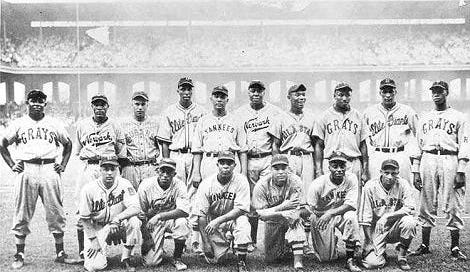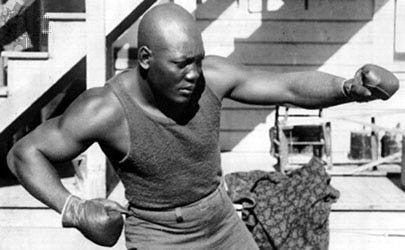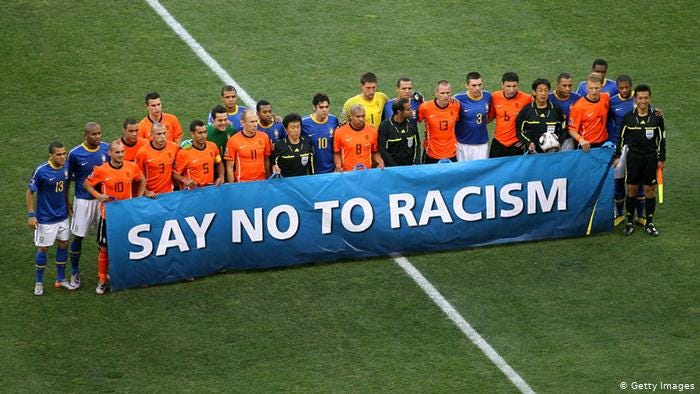The History of Racism in Sports
how athletes leveraged their platform to protest against racial discrimination
Sports, Tech, Biz is a weekly newsletter that features insights and analysis of the sports business. If you are not already a subscriber, join 1,000+ founders, investors, and professionals who read it every week:
The History of Racism in Sports
The role of race in sports is complex, and it has been examined from many angles by historians, sociologists, and scientists.
For the entire history of modern sports, race has been a critical dividing concept, particularly between people with black and white skin color.
During the early 1900s, most black athletes were excluded from participating in organized sports internationally and professional competitions such as the Olympics.
Society forced African-Americans to establish segregated, independent teams and leagues in football, basketball, baseball, cricket, and rugby.
These separate organizations gave great pride to black communities and served as visible examples of black organizational and entrepreneurial skills during the early 1900s. Nevertheless, even with integrated competition, discrimination frequently happened.
Black baseball’s first successful league in the US was born in 1920, known as the “National Negro Baseball League (NNL).”
The NNL collapsed in 1931 because of financial instability and inadequate working and living conditions of the league’s members, who additionally suffered the public indignities of being part of the black community.
Racism was widespread in the US and became more violent when lynchings were common, and the Ku Klux Klan incited racial hatred.
Jack Johnson
Some consider Jack Johnson as the pioneer of black athlete inclusion in sports.
He was called “Bad Nigger” due to his fearless lifestyle and multiple affairs with women. Jack was the first African-American to win the world’s heavyweight boxing championship in 1908.
Jack’s controversial lifestyle and role in sports made many people angry in white and black communities. He was eventually convicted to serve jail time at a federal prison in the US.
The athletic success of Jack Johnson, along with the performance of Jesse Owens at the 1936 Olympics in Berlin, finally generated significant attention for black athletes in society.
Between world wars, the inclusion of black athletes in sports made significant progress. Many white liberals vowed to include black athletes in games, but the majority still had multiple prejudices against them.
Advances were also being made in high schools and universities as they began to have small numbers of black athletes on their sports teams, particularly in football and track and field.
Sportswriters of the era played a significant role in the battle against racism in organized sports, as they continually hammered institutions for discriminating against black athletes across multiple disciplines.
After the Second World War, the barriers to participation began to fall.
Suppressing segregation was not an easy process, and in some sports, such as basketball, coaches and officials attempted to ensure that the majority of players on the court or field at any one time were white.
Toward the late 1960s, African-American athletes such as Muhammad Ali, Bill Russell, Tommie Smith, and John Carlos used their platform to advocate for civil rights by actively protesting against racial discrimination.
Those acts inspired thousands yet unleashed rage on the public. Those athletes had to endure multiple threats of losing their careers if they continued to stand for their beliefs.
By the early 1970s, all leagues in the US rejected race or ethnicity segregation, and the Olympics opened increasingly to athletes from all countries.
By the 1990s, segregation in sports was abolished nearly worldwide, though the issue of race in society was nowhere near the ‘end of its history.’
Opportunities for black men and women beyond the playing field have increased through time, though not as equal in society as on the playing fields and courts.
Today, sports is a globalized industry that allows athletes to compete almost anywhere. Nevertheless, stereotypes, biases, and prejudices continue to cloud the perception of fans and the media, and some athletes are still victims of racist offenses worldwide.
We cannot ignore the role of sports in society. Athletes today are followed and inspire millions of people around the globe. From Jack Johnson to Muhammad Ali and Colin Kaepernick, we’ve learned that professional athletes are factors of change in society.
The history of race and sport has effectively moved from the introduction and adoption phases to the journey of adjustments and improvements on the political side of race in society.
While great strides have been made in sports to accept people of color, much remains to resolve.
Learning from the history of racism in sports can help us understand the events happening in the present and the BLM movement.
“Those who don't learn from the past are condemned to repeat it.”







